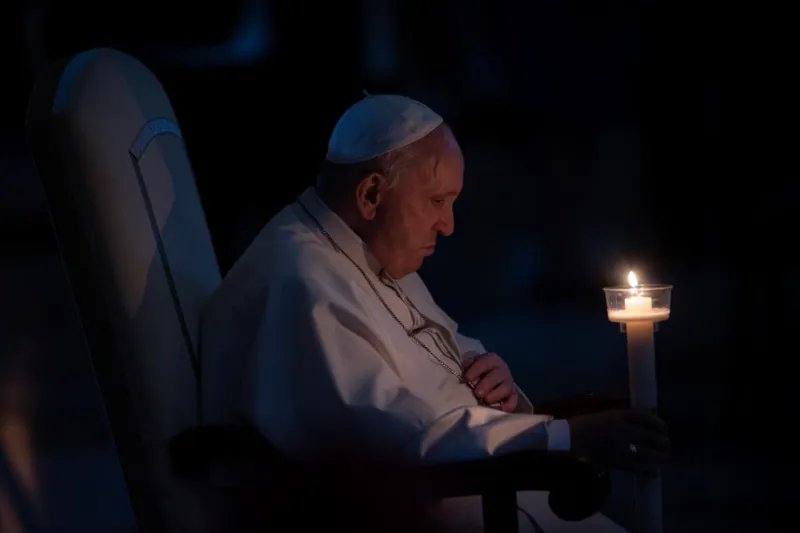 Pope Francis prays at the Easter Vigil Mass in St. Peter’s Basilica on April 16, 2022. / Daniel Ibanez/CNA
Pope Francis prays at the Easter Vigil Mass in St. Peter’s Basilica on April 16, 2022. / Daniel Ibanez/CNA
Vatican City, Apr 16, 2022 / 13:45 pm (CNA).
At the Vatican’s Easter Vigil Mass, Pope Francis said that Jesus has “entered the tomb of our sin” and restored us to life.
“Let us celebrate Easter with Christ! He is alive! Today, too, he walks in our midst, changes us and sets us free,” Pope Francis said in his homily in St. Peter’s Basilica on April 16.
“Thanks to him, evil has been robbed of its power; failure can no longer hold us back from starting anew; and death has become a passage to the stirrings of new life.”
“For with Jesus, the Risen Lord, no night will last forever; and even in the darkest night … the morning star continues to shine,” the pope said.
Pope Francis did not preside over the Easter Vigil Mass or participate in the Paschal candle procession, but sat in the front of the congregation in a white chair.
The pope has suffered from acute knee pain recently which has made it difficult to walk and has led him to cancel some public appearances.
Cardinal Giovanni Battista Re, the dean of the College of Cardinals, served as the main celebrant of the Mass. The pope participated in the Easter Vigil by delivering the homily and baptizing seven catechumens.
In his homily, Pope Francis spoke of bringing Christ’s light into days “marked by the horrors of war” through gestures of peace and acts of compassion.
“Let us make Jesus, the Living One, rise again from all those tombs in which we have sealed him,” Francis said.
“Let us bring him into our everyday lives: through gestures of peace in these days marked by the horrors of war, through acts of reconciliation amid broken relationships, acts of compassion towards those in need, acts of justice amid situations of inequality … and of truth in the midst of lies,” he added.
A Vatican spokesman said that the pope also met briefly with a delegation of local government officials from Ukraine ahead of the Mass.
The Easter Vigil, which takes place on Holy Saturday night, “is the greatest and most noble of all solemnities,” according to the Roman Missal.
The liturgy began in darkness with the blessing of the new fire and the preparation of the Paschal Candle. The candle symbolizes the light of Christ, which “shines in the darkness” and “has not overcome it.” (John 1:5)
Re and the concelebrating cardinals, bishops, and about 200 priests processed through the dark church carrying lit candles to signify the light of Christ coming to dispel the darkness.
“Many writers … have evoked the beauty of starlit nights. The nights of war, however, are riven by streams of light that portend death,” Pope Francis said in his homily.
“On this night, brothers and sisters, let us allow the women of the Gospel to lead us by the hand, so that, with them, we may glimpse the first rays of the dawn of God’s life rising in the darkness of our world.”
Pope Francis baptized seven people in St. Peter’s Basilica during the Easter Vigil Mass, including an American, Taylor Pescante.
The congregation prayed the Litany of the Saints and renewed their baptismal promises as Pescante prepared to be received fully into the Catholic Church, alongside four Italians, one Albanian, and one Cuban.
“Brothers and sisters our hope has a name: the name of Jesus,” Pope Francis said.
“He entered the tomb of our sin; he descended to those depths where we feel most lost; he wove his way through the tangles of our fears, bore the weight of our burdens and from the dark abyss of death restored us to life and turned our mourning into joy.”
At the beginning of the liturgy, a cantor sang the Exsultet Easter Proclamation, which tells the story of salvation from the creation, the testing and fall of Adam, the liberation of the people of Israel from slavery in Egypt, and culminates in Jesus Christ, who died for our sins and leads us to salvation.
The basilica was lit up gradually until it was fully illuminated at the Gloria, when the bells of St. Peter’s tolled.
About 5,500 people were present inside the basilica for the Vigil Mass, according to the Holy See Press Office.
The pope is also scheduled to celebrate Mass on Easter Sunday morning in St. Peter’s Square, followed by the traditional “Urbi et Orbi” blessing.
“How beautiful is a Church that can run … through the streets of our world. Without fear, without schemes and stratagems, but solely with the desire to lead everyone to the joy of the Gospel,” Pope Francis said.
“That is what we are called to do: to experience the risen Christ and to share the experience with others; to roll away the stone from the tomb where we may have enclosed the Lord, in order to spread his joy in the world.”
[…]





Leave a Reply